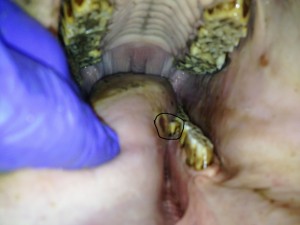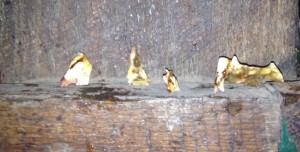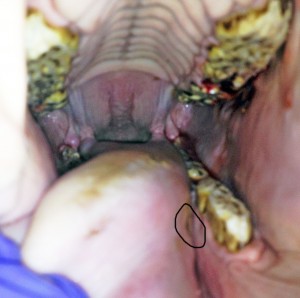The importance of routine dental care is illustrated with these few photos. As horses age their teeth erupt, change and develop abnormalities with the teeth. These abnormalities can cause pain, discomfort, riding behavioral issues. Dental problems is the number one cause of riding behavioral issues. During the ages of 2 – 4 years old a lot of changes occur in the horses mouth due to the eruption of the permanent premolar thereby pushing the deciduous or baby tooth out of the dental arcade. If these teeth are not manually removed they can become retained dental caps or stuck in the gum-line or on the permanent tooth. The retained deciduous tooth can cause eating problems or ulcers as depicted in these photos. The black circle on the photo highlights the portion of the retained cap that is rubbing against the tongue to create the lingual ulcer. The ulcer was about 1/2 inch x 1 inch in size. Also note the sharp points on the outside or buccal surface of the upper arcade and the inside or lingual side of the lower arcade.

Since the horse’s upper dental arcade is wider then the lower arcade and the teeth continue to erupt until they are about twenty years old, the sharp points will return along with possibly other pathological changes to the dental arcade. This is why a horses teeth should be checked annually and floated as needed. Some floats will only last 6 to 12 months while others last 18 to 24 months, depending on the professional doing the floating treatment.
In the next photo you can see the correction that has been performed on the teeth. The retained caps have been remove and the sharp points filed down. The ulcer is highlighted by the circle and the blood on the tooth is where deciduous caps have been removed from the gum. The ulcer will take 5 – 7 days to heal. The equine will feel and eat a lot better and there should be no need for antibiotics. The last photo is of the pieces of retained caps removed from the mouth. The cap on the far right is about half the size of a full cap with the rest being only potions of retained caps. As you can see the retained caps have very sharp points, capable of doing and causing a lot of damage and discomfort to a horses mouth.


